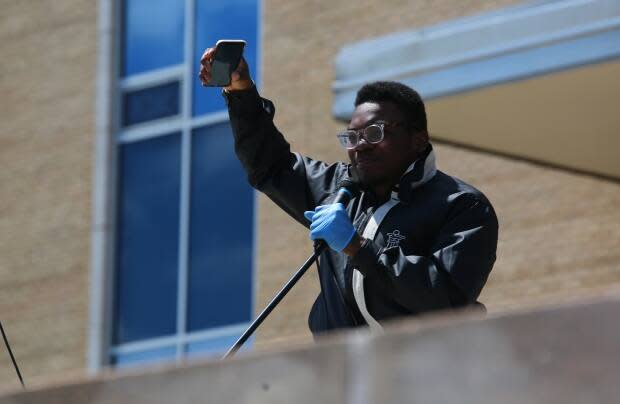Black Lives Matter organizers in N.L. look back and push forward, 1 year after rally

In the year since the inaugural Black Lives Matter rally in St. John's, organizers say, more people have been looking to challenge systemic racism and start conversations around equality but, they say, progress can't stop there.
An undeniable shift happened after the killing of George Floyd, said Raven Khadeja, who co-founded Black Lives Matter NL in the wake of Floyd's death. Former Minneapolis police officer Derek Chauvin murdered Floyd, a handcuffed Black man, by kneeling on his neck for more than nine minutes.
Floyd's murder made the world stop, Khadeja said, and was felt in Newfoundland and Labrador.
"Instead of looking at racism as the systematic killing of Black people, we had the conversation of what systemic racism looks like to Black people in this province," she said.
"It's not the same, but it's still just as harmful. And that, I think, is progress in that regard."
The rally
Organizers planned a rally for June 6, 2020, but didn't expect the swell of support they received.

Thousands of people knelt outside the Confederation Building in solidarity.
"To see that many turn out, it was very emotional for everyone on the team, to be honest," said Precious Familusi, another Black Lives Matter NL co-founder.
Moving forward
While there's been progress, Familusi and Khadeja want to build on the momentum.
Classrooms and corporations are a place to start, they said.
Teachers have been asking Black Lives Matter NL to speak to their class, but they've been initiating that dialogue themselves, Khadeja said.

She says Black Canadian history and anti-Black racism should be part of the curriculum.
"[Children] are perfectly capable of understanding what is bias, what is privilege," she said. "They are very, very knowledgeable.… We need — as a province — to look at how we can tap into that to really make the change that will actually be sustainable, not just for now."
The Department of Education says cultural diversity is "first broached" in Grade 3 and that students learn about "the experience of Black Canadians in the 20th century" in Grade 9. In a statement, however, the province said there is a need for change.
"While the curriculum is strong on the issues of acceptance, understanding, equal rights and the negative impacts of racism, among other related topics, there is a recognition that future updates must focus more specifically on this topic with a lens of anti-racism."
A ministerial committee on anti-racism education is in the works, according to the department, with the expectation the committee's work will help guide updates to curricula.

Corporations can also actively make change by offering training to prevent anti-Black racism. Familusi would like the provincial government to make that training compulsory in order to work in public offices or private businesses.
It's not enough to hire marginalized staff in just entry-level positions, he said, and there shouldn't just be work in home care and service industries, Khadeja added.
"It's good to be an ally, but not just an ally for the showcase. What are you actually doing to empower your Black employees? Are you giving them the space to elevate them to higher roles in your organization?" Familusi asked.
Companies need to ask themselves who's not being represented in a room, whose voices aren't being heard and if the same level of racialized representation is seen in their leadership, he said.
"Those are strong steps that we can build up, to take, to not just empower the next generation, but also the people that are currently working in different workplaces as well."

